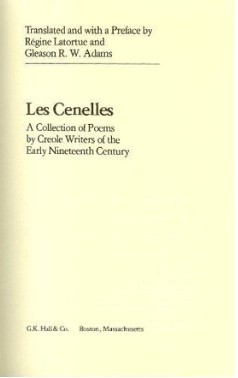Les Cenelles: A Collection of Poems by Creole Writers of the Early Nineteenth Century
by Armand Lanusse
Nonfiction, Hardcover, 165 pages
More Info
Description of Les Cenelles: A Collection of Poems by Creole Writers of the Early Nineteenth Century by Armand Lanusse
Originally published in 1845, Les Cenelles, was the first anthology of poetry featuring the work of Black poets.
The following description is excerpted from the The Concise Oxford Companion to African American Literature
Les Cenelles, published in 1845 in New Orleans, was the first anthology of poetry by Americans of color. The title’s use of the word “cenelles,” meaning holly or hawthorne berries, suggests that the volume contains the collected fruit of the Creole community that produced it. Edited by poet and educator Armand Lanusse (1812–1867), the collection features the work of seventeen New Orleans poets who, like Lanusse, were well-to-do “free people of color” (gens de couleur libres), a group with a unique cultural life distinct from that of whites on the one hand and slaves on the other. Contributors range from prosperous merchants such as cigar maker Nicol Riquet and mason Auguste Populus to such locally well-known figures as Lanusse, who worked to found black educational institutions; Joanni Questy, a widely read journalist for the militant newspaper La tribune de la Nouvelle Orléans; and Victor Séjour, whose highly successful playwriting career in Paris made him antebellum Louisiana’s most distinguished writer.
Lanusse explains in the introduction that the collection is intended to defend his community and race, preserving for future readers its high level of cultural-educational achievement. Culture serves here as a means of refuting and struggling against rationales for a racially divided society.
In content and form, the eighty-four poems in Les Cenelles are modeled on French romanticism. They are self-consciously elegant, conventional poetic statements (conventionality here is an index of sophistication) ranging from the facetious to the elegiac and tragic. Principle themes are love, both disappointed and fulfilled; disillusionment and the contemplation of death (five poems concern suicide); and the vicissitudes and dignity of the poetic vocation. Considering its general emphasis on disappointment and disillusionment, the collection is not, as some commentators suggest, primarily a group of light, sentimental love poems. Love in romantic poetry is a surrogate for higher aspirations that for this racially defined community remain frustrated and unfulfilled. When love appears in positive terms, it is cultural refinement and elevation rather than simple passion that is being affirmed.

Additional Book Information:
- ISBN: 9780816183258
- Imprint: G. K. Hall & Company
- Publisher: Gale
- Parent Company: Cengage Learning
